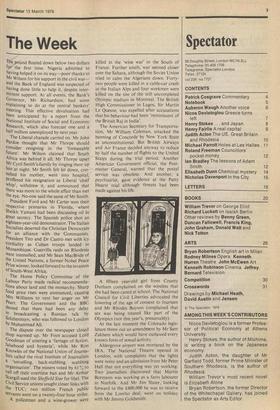The Week
The pound floated down below two dollars for the first time. Nigeria admitted to having helped it on its way—poor thanks to Mr Wilson for his support in the civil war— and the Bank of England was suspected of having done little to help it, despite intermittent support. At all events, the Bank's Governor, Mr Richardson, had some explaining to do at the central bankers' meeting. This effective devaluation had been anticipated by a report from the National Institute of Social and Economic Research, which also forecast one and a half million unemployed by next year. The Liberal charade carried on. Mr John Pardoe thought that Mr Thorpe should Consider resigning in the 'foreseeable future'. Mr Wilson claimed that South Africa was behind it all. Mr Thorpe upset Mr Cyril Smith's.family by ringing them up late at night. Mr Smith felt let down, consulted his mother, went into hospital, Proffered his resignation as Liberal 'chief Whip', withdrew it, and announced that there was more to the whole affair than met the eye. No-one said the same of Mr Smith.
President Ford and Mr Carter won their respective primaries in 'Florida, where Sheikh Yamani had been discussing oil in great secrecy. The Spanish police shot an eighteen-year-old demonstrator. The Italian Socialists deserted the Christian Democrats for an alliance with the Communists. President Tito and Dr Castro met with icy Cordiality as Cuban troops landed in Mozambique. Guerrilla raids on Rhodesia Were intensified, and Mr Sean MacBride of the United Nations, a former Nobel Peace Prize winner, looked forward to the invasion of South-West Africa.
The Home Policy Committee of the Labour Party made radical recommendations about land and the monarchy. Sharp food price rises were announced, causing Mrs Williams to vent her anger on Mr Peart. The Government and the BBC denied that there had been any delay lo broadcasting a Russian talk by Solzhenitsyn, who was followed to London by Muhammad Ali.
The dispute over the newspaper closed shop warmed up. Mr Foot accused Lord Goodman of uttering a 'farrago of fiction, falsehood and hysteria', while Mr Ron Knowles of the National Union of Journalists called the rival Institute of Journalists a 'snivelling, back-stabbing, scabbing organisation'. The miners voted by 61% to call off their overtime ban and Mr Arthur Seargill sued the Sheffield Star for libel. The Civil Service unions sought closer links with the TUC; two million French public servants went on a twenty-four hour strike.
A policeman and a wine-grower were killed in the 'wine war' in the South of France. Further south, war seemed closer over the Sahara, although the Soviet Union tried to calm the Algerians down. Fortytwo people were killed in a cable-car crash in the Italian Alps and four workmen were killed on the site of the still uncompleted Olympic stadium in Montreal. The British High Commissioner in Lagos, Sir Martin Le Quesne, was expelled after accusations that his behaviour had been 'reminiscent of the British Raj in India'.
The American Secretary for Transportation, Mr William Coleman, attacked the banning of Concorde by New York State as unconstitutional. But British Airways and Air France decided anyway to reduce by half the number of flights to the United Statps during the trial period. Another American Government official, the Postmaster General, warned that the postal service was obsolete. And another, a psychiatrist, gave evidence at the Patty Hearst trial although threats had been made against his life.
A fifteen year-old girl from County Durham complained on the wireless that she had been caned at school. The National Council for Civil Liberties advocated the lowering of the age of consent to fourteen and Mr Rhodes Boyson complained that sex was being treated like part of the Olympics (not this year's, presumably).
At the last moment the Colorado legislature threw out an amendment by Mr Sam Zakhem which would have outlawed every known form of sexual activity.
Aldergrove airport was mortared by the IRA. The National Theatre opened in London, with complaints that the lights were noisy and an admission from Mr Peter Hall that not everything was yet working. Two journalists discovered that Martin Bormann was working as a farm labourer in Norfolk. And Mr Jim Slater, looking forward to the £.400,000 he was to receive from the Lonrho deal, went on holiday with Mr Jimmy Goldsmith.


































 Previous page
Previous page